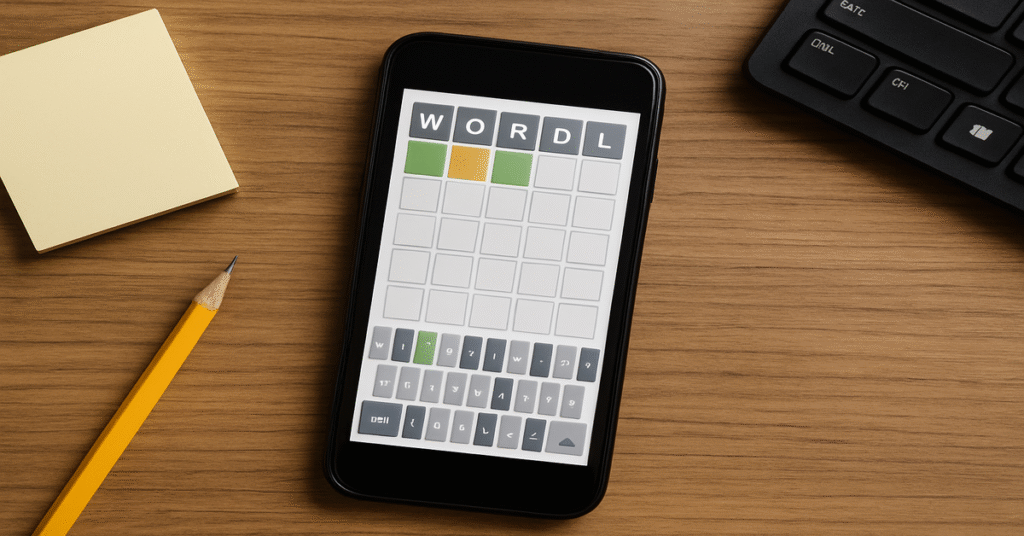Wordle Hints Today has become a global phenomenon, combining simple mechanics with addictive gameplay that draws millions of players daily. Though the rules are straightforward — guess a five-letter word in six tries — mastering the game demands strategy, logic, vocabulary skills, and intuition.
In this article, we’ll take a deep, structured look into Wordle hints today — understanding how to analyze daily puzzles, devise powerful strategies, and become a consistently strong player.
What Is Wordle?
The Birth of a Viral Game
Wordle was created by Josh Wardle in 2021 as a personal project for his partner, who loved word games. Its clean, minimalist design and daily puzzle format made it an instant hit, culminating in The New York Times acquiring it soon after its viral spread.
Simple Rules, Deep Complexity
Players have six attempts to guess a secret five-letter word. After each guess:
- Green squares indicate correct letters in the correct position.
- Yellow squares indicate correct letters in the wrong position.
- Gray squares indicate incorrect letters.
Despite the simplicity, the puzzle demands sharp deduction skills and knowledge of word patterns.
Why Wordle Hints Are Important Today
Increasing Puzzle Difficulty
While Wordle remains accessible, some daily puzzles are intentionally challenging, featuring rare words, repeated letters, or tricky consonant blends. Getting strategic hints can often mean the difference between victory and failure.
Building Strategic Thinking
Hints encourage players to approach the puzzle methodically, considering letter frequency, common prefixes and suffixes, and positional patterns.
Anatomy of an Effective Wordle Hint
Starting Strong: The Opening Word
Choosing an excellent starting word is crucial. Ideally, the first guess covers a wide range of vowels and common consonants. For example:
- “CRANE”
- “SLATE”
- “AUDIO”
These starting words maximize your information from the first turn.
Analyzing Feedback Systematically
After your first guess:
- Green letters should be fixed immediately in place.
- Yellow letters must be moved around systematically.
- Gray letters should be eliminated from consideration entirely.
Tracking and Visual Memory
A mental (or physical) grid can help players remember what letters have been tried and what positions are ruled out.
Core Strategies for Today’s Wordle
Use Common Letters First
Focus on high-frequency letters like E, A, R, T, O, N, S, L, and C early in the game.
Prioritize Vowels
Identifying vowels quickly is critical because they form the skeleton of most words.
Manage Double Letters
Words with double letters (e.g., “COOL,” “SLEEP”) are trickier because the repetition isn’t obvious unless guessed directly.
Avoid Wasted Guesses
If you’re unsure, make exploratory guesses that introduce multiple new letters instead of confirming known ones prematurely.
How to Generate Personal Wordle Hints Today
Creating a Word Bank
Having a mental (or written) list of common five-letter words helps make fast guesses without scrambling.
Using Logical Deduction
If you know two letters are correct but misplaced, think about typical English spelling patterns rather than random combinations.
Time-Boxed Thinking
Don’t linger too long on one idea. If you’re stuck for more than two minutes, it’s often better to make a low-stakes exploratory guess.
Examples of Wordle Hints in Action
Scenario 1: First Guess – AUDIO
Result:
- A: Green
- U: Gray
- D: Gray
- I: Yellow
- O: Gray
Hint:
You know the word starts with A and contains an “I” not in the fourth position. Focus on common words fitting that mold like “ALIVE” or “AMITY.”
Scenario 2: Third Guess – CRANE
Result:
- C: Gray
- R: Green
- A: Green
- N: Gray
- E: Yellow
Hint:
With R and A correctly placed, and E somewhere else, possibilities narrow dramatically — words like “RAISE” or “RAVEL” come to mind.
The Psychology Behind Wordle Hints Today
Cognitive Load Reduction
Effective hints reduce cognitive overload, helping players focus on manageable options instead of overwhelming possibilities.
Pattern Recognition Enhancement
Hints help players recognize phonetic and structural patterns more quickly, improving success rates over time.
Confidence Building
Getting timely hints boosts confidence, making players more adventurous and willing to tackle harder puzzles in the future.
Common Mistakes Players Make Without Hints
Ignoring Letter Position Feedback
Misreading green, yellow, and gray clues leads to repeated mistakes and wasted guesses.
Over-Focusing on One Word
Getting stuck on a single word guess without considering alternatives narrows cognitive flexibility.
Forgetting About Plural Forms
Sometimes the answer could simply be a plural form (e.g., “BANDS”) and players overlook the simple addition of “S.”
Building Your Daily Wordle Routine
Morning Puzzle Practice
Tackling the daily puzzle first thing builds consistency and mental alertness.
Reflection and Review
After solving (or failing), reviewing your guesses helps identify weaknesses and refine strategy for tomorrow.
Friendly Competition
Playing with friends or family adds accountability and makes the game more engaging.
Alternative Tools and Aids for Wordle Enthusiasts
Wordle Solvers
While purists may frown upon solvers, using them after you attempt the puzzle can be a great learning tool.
Word Pattern Lists
Having access to lists of common five-letter words sorted by vowel and consonant frequency is tremendously helpful.
Vocabulary Builders
Apps like vocabulary quizzes or flashcards can indirectly boost your Wordle skills by expanding your mental dictionary.
How Wordle Hints Today Help Advanced Players
Narrowing Search Space Faster
Hints allow skilled players to rapidly eliminate impossible options, making the game a battle of logic rather than guesswork.
Targeted Risk-Taking
Using hints smartly enables players to take calculated risks, sometimes sacrificing one guess to win faster.
Mind Mapping Words
Advanced players mentally map related words based on the feedback and potential roots, prefixes, and suffixes.
How Wordle Hints Differ for Beginners and Experts
Beginners
- Need broader, more general hints
- Focus on basic letter identification
- Benefit from fixed starting words
Experts
- Need precision-targeted hints
- Focus on specific phonetic combinations
- Change starting words based on intuition and statistics
How to Give Better Wordle Hints to Others
Focus on Structure, Not Answers
Rather than giving away the word, guide the player towards figuring out vowel placement, consonant blends, or repeated letters.
Tailor the Hint to the Situation
Are they stuck on vowels? Suggest trying words with multiple vowels. Are they missing a rare consonant? Point out less common letters like Q, Z, or X.
Conclusion
Wordle is deceptively simple yet endlessly fascinating. Mastering it day after day requires more than luck — it’s a dance of logic, intuition, and language mastery. Getting timely and thoughtful hints can transform a frustrating guessing game into a highly satisfying mental challenge.
Whether you’re a casual player looking for a little extra help or an aspiring Wordle champion, the key is consistency, reflection, and strategic thinking. By applying the methods and approaches outlined here, you’ll find that cracking the daily Wordle puzzle becomes a thrilling and rewarding part of your routine.
FAQs
Q1: What makes a good starting word for Wordle?
A good starting word should include multiple vowels and common consonants to gather maximum information on the first guess.
Q2: How can I improve my Wordle skills quickly?
Practice daily, study common five-letter words, and use pattern recognition strategies to improve both speed and accuracy.
Q3: Is it cheating to use Wordle hints?
Hints are tools for learning. Using them strategically enhances skill development rather than simply handing over the answer.
Q4: How do I handle Wordle words with repeated letters?
Stay alert: if a letter turns green or yellow early on, don’t assume it appears only once. Explore options with double letters if stuck.
Q5: What should I do if I get stuck on a Wordle puzzle?
Take a logical exploratory guess that introduces several new letters rather than freezing or guessing randomly.
Q6: Can Wordle improve my overall vocabulary?
Absolutely! Regular playing sharpens spelling, phonetics, and general vocabulary, especially when combined with reflection after each game.







